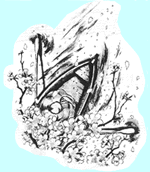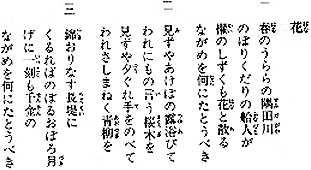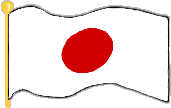花
Sakura is how you say cherry tree in Japanese. You can write Sakura in Japanese as 桜or 櫻. This song is called Hana, which means blossoms. Hana is synonymous with cherry blossoms in Japan, especially in traditional literature.
When the Cherry Blossoms bloom in March or April, people in Japan have Cherry Blossom viewing parties called Hanami. You can read more about Hanami on Mama Lisa's World Blog!
花
Cherry Blossoms
Folk Song
Folk Song
(Japanese)
(English)
春のうららの 隅田川、
のぼりくだりの 船人が
櫂(かひ)のしづくも 花と散る
ながめを何に たとふべき
見ずやあけぼの 露浴びて
われにもの言ふ 桜木を
見ずや夕ぐれ 手をのべて
われさしまねく 青柳(あおやぎ)を
錦おりなす 長堤(ちょうてい)に
くるればのぼる おぼろ月
げに一刻も 千金の
ながめを何に たとふべき
How happy, spring has come over the Sumida*,
Rowing up, rowing down in the warm sunbeams,
Drops from the boatmen's oars look like cherry blooms,
How can I describe for you the view o'er the streams?
Lo, see the cherry trees that stand in the morning mist,
I hear them speak to me in a tender tone,
In the eve I love to see the waving willows,
They stretch their hands to me strolling alone.
Oh, see the hazy moon rising o'er the banks,
Rows of cherry trees standing o'er the stream,
How I love the cherry blossoms in the moonlight!
How can I describe for you the night like in a dream?
Notes
*The Sumida River, which runs along the banks of Tokyo, Japan.
Coco wrote:
I saw that you wanted the full romaji text to this song. I speak Japanese so i translated it into romaji, hope it helps. This is based off of the Japanese lyrics you have on your site. - Coco Nakano
Pronunciation
Hana
Haru no urara no sumida gawa
Nobori kudari no funabito ga
Kahi no shizuku mo hana to chiru
Nagame wo nani ni tatoubeki.
Mizuya akebo no tsuyu abite
Wareni mono iu sakuragi wo
Mizuya yuugure te wo nobete
Ware sashi maneku aoyagi wo.
Nishiki orinasu choutei ni
Kurureba noboru oborozuki
Geni ikkoku mo senkin no
Nagame wo nani ni tatoubeki.
Composer: Rentarō Taki/作曲:滝 廉太郎
Lyrics:Hagoromo Takeshima/作詞:武島 羽衣
Year: 1900

Comments




Thanks!
Thanks!
Thanks!
Thanks and Acknowledgements
Many thanks to the Japan Information and Culture Center, a part of the Embassy of Japan, for contributing this song, the translation, illustration and the sheet music. Thanks to Coco Nakano and Intorn Wattana for the romaji text. Thanks to Mel B., Jasmin Duncan, and Yoko Collier-Sanuki for the Japanese text.
Arigato gozaimasu! 


























